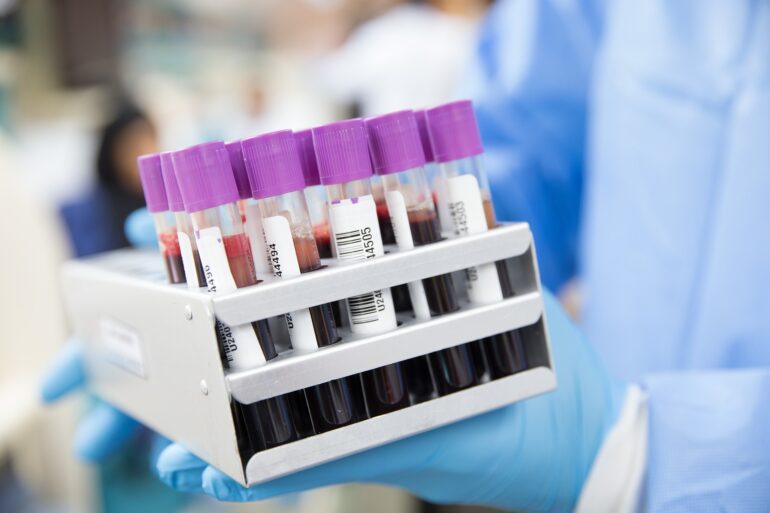TL;DR:
- Researchers at Johns Hopkins Kimmel Cancer Center developed GEMINI, a novel blood test using genome-wide sequencing and machine learning for early cancer detection.
- GEMINI analyzes single molecules of DNA shed from tumors to identify mutations across the genome.
- The test showed over 90% accuracy in detecting lung cancers, including early-stage cases.
- GEMINI’s machine learning classifier generates a score indicating the probability of cancer presence.
- It could be used to monitor cancer patients during therapy and detect other cancer types like liver cancer and melanoma.
- Combining GEMINI with DELFI improved the detection of early-stage lung cancer.
- GEMINI may detect cancer years before standard diagnoses, potentially revolutionizing cancer screening.
- The test needs further validation in larger clinical trials before potential market availability.
Main AI News:
Cutting-edge technology and innovative research are converging at the Johns Hopkins Kimmel Cancer Center, giving rise to a groundbreaking blood testing method that holds the promise of detecting cancer, including lung cancer, at much earlier stages. Aptly named GEMINI (Genome-wide Mutational Incidence for Non-Invasive detection of cancer), this novel test is a potent amalgamation of genome-wide sequencing and advanced machine learning techniques.
The GEMINI test begins with the collection of a blood sample from individuals at risk of developing cancer. Next, the team isolates cell-free DNA (cfDNA) shed by tumors from the plasma and subjects it to cost-efficient whole genome sequencing. Through meticulous analysis of single DNA molecules, the test identifies sequence alterations, effectively creating mutation profiles spanning the entire genome.
Key to GEMINI’s prowess is a machine learning model specifically trained to recognize cancerous mutations and distinguish them from non-cancerous ones across various genomic regions. This cutting-edge classifier assigns a score ranging from 0 to 1, with higher scores indicating a greater likelihood of cancer presence.
In an impressive series of laboratory tests, GEMINI, when paired with computerized tomography imaging, managed to detect over 90% of lung cancers, even those at early stages like I and II. This exciting proof-of-concept study was published in the prestigious journal Nature Genetics.
Dr. Victor Velculescu, senior study author and an esteemed professor of oncology and co-director of the cancer genetics and epigenetics program at the Kimmel Cancer Center, expressed his optimism about the potential of GEMINI. He noted that this test could be a game-changer, enabling early cancer detection and aiding in monitoring patients during therapy.
While the study initially focused on lung cancer in high-risk populations, Daniel Bruhm, lead study author and graduate student in the human genetics program at the Johns Hopkins University School of Medicine, revealed the broader implications. The researchers identified altered mutational profiles in cfDNA from patients with other cancers, such as liver cancer, melanoma, and B cell non-Hodgkin lymphoma, suggesting GEMINI’s versatility in a wide array of cancer types.
To develop GEMINI, the team scrutinized whole-genome sequences of cancers from 2,511 individuals across 25 different cancer types, gaining insight into distinct mutation frequencies across various tumors. Notably, lung cancers exhibited an average of 52,209 somatic mutations per genome.
Excitingly, GEMINI’s capabilities were tested on 365 individuals in the Longitudinal Urban Cohort Aging Study (LUCAS), a cohort of high-risk subjects. The test successfully distinguished cancer patients from non-cancer individuals by yielding higher GEMINI scores in the former. Additionally, combining GEMINI with DELFI (DNA evaluation of fragments for early interception), a previously developed test detecting changes in cfDNA fragment sizes and distribution, led to an even more robust detection of early-stage lung cancer.
GEMINI’s potential to identify cancer before standard diagnoses were evident in patients who did not show any detectable tumors at the time of blood collection. Remarkably, they displayed a median GEMINI score of 0.78, higher than individuals without cancer. Subsequent testing confirmed that six of these patients eventually received lung cancer diagnoses, demonstrating GEMINI’s ability to detect abnormalities in cfDNA mutation profiles years before conventional methods.
The researchers also observed GEMINI’s proficiency in discerning between different subtypes of lung cancer and its potential to detect early-stage liver cancers. Moreover, in a cohort receiving lung cancer drug treatment, GEMINI scores decreased during the initial response to therapy, suggesting its suitability for patient monitoring during treatment.
Dr. Rob Scharpf, associate professor of oncology at the Kimmel Cancer Center, asserted that the combination of genome-wide GEMINI mutation analyses and DELFI fragmentation analyses of cfDNA could pave the way for cost-efficient and scalable cancer detection. While larger clinical trials are still required to validate the test’s efficacy, the immense promise shown by GEMINI has opened new horizons in the early diagnosis and treatment monitoring of cancers.
Conclusion:
The development of GEMINI, a revolutionary blood test for early cancer detection, represents a significant breakthrough in the medical industry. Its high accuracy in detecting various cancer types, including at early stages, coupled with the potential for early intervention and therapy monitoring, indicates promising market opportunities in the healthcare and diagnostics sectors. However, extensive validation through larger clinical trials will be crucial before it can make a substantial impact and be adopted on a broader scale.

